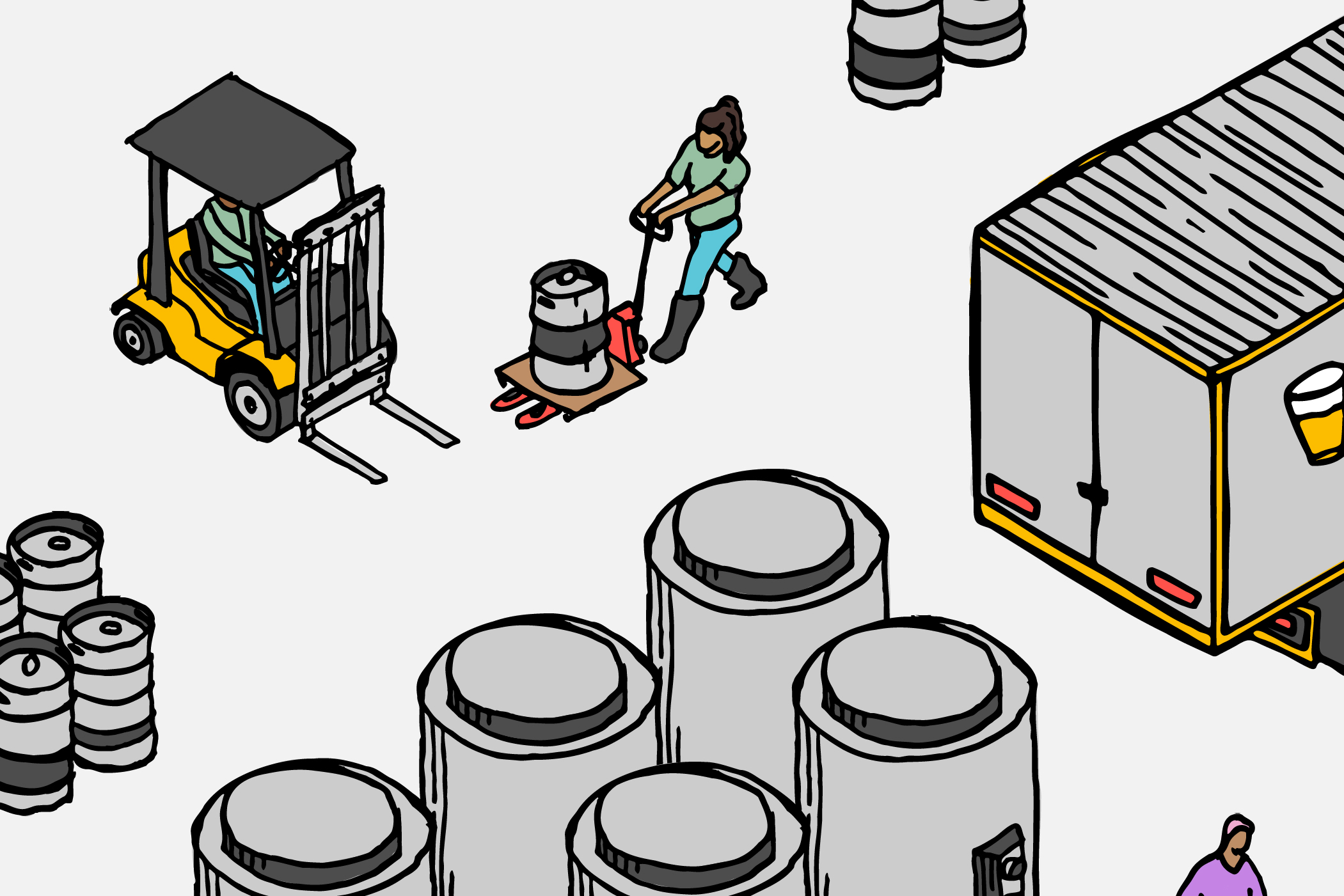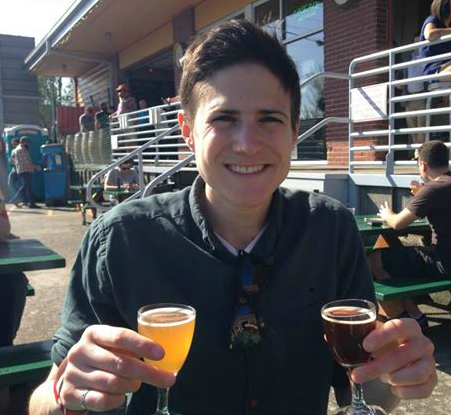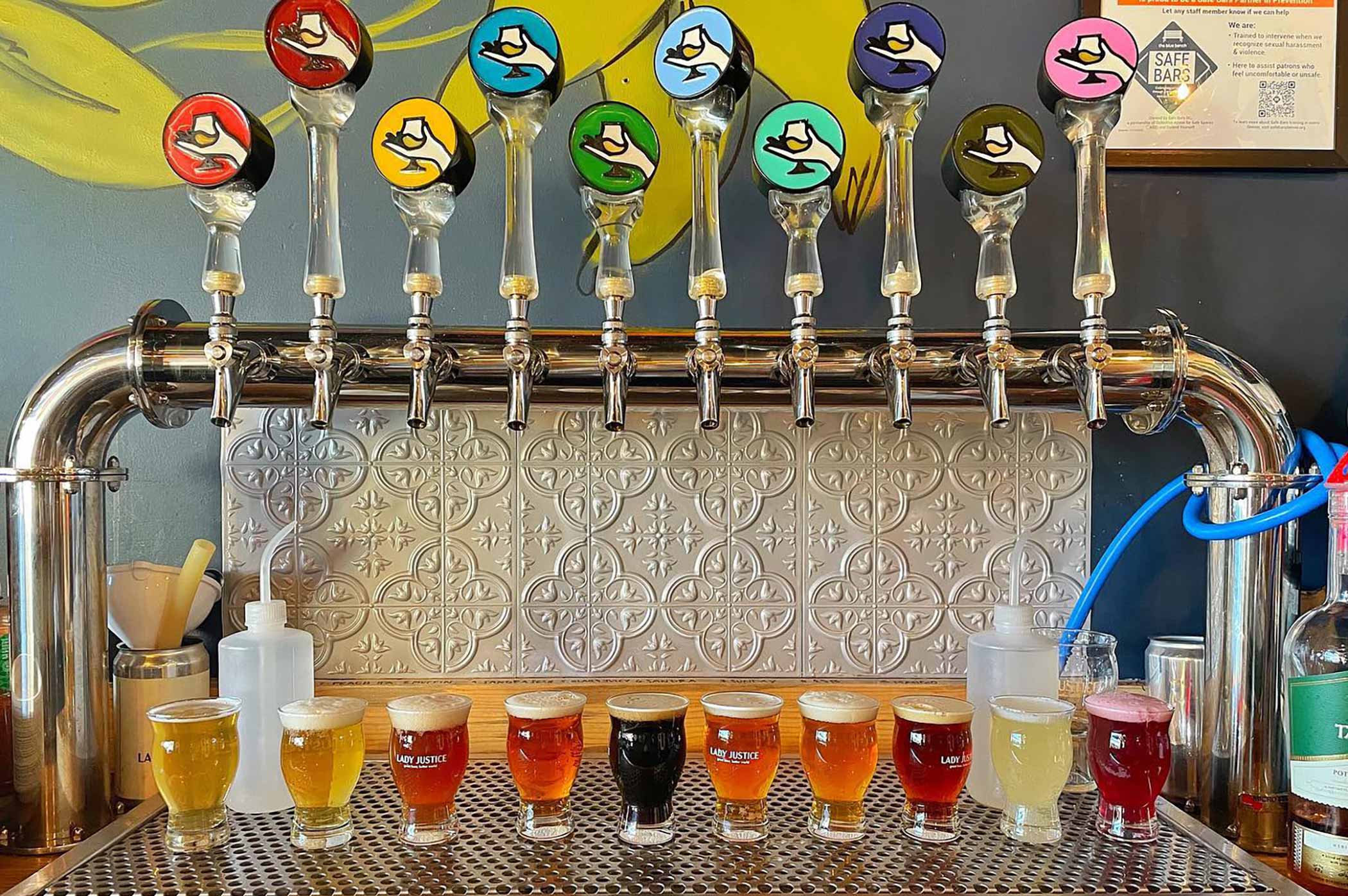Shop
Creating Safer Spaces in Beer, Part Three — Does Every Brewery Need a Code of Conduct?
Part three of ten.
[Creating Safer Spaces in Craft Beer, Part One — Why Isn’t Craft Beer More Diverse?]
[Creating Safer Spaces in Craft Beer, Part Two — What Does a Safe Space Look Like?]
“Creating Safer Spaces in Craft Beer” is an in-depth, ten-part series examining why it’s important to embrace diversity, equity, and inclusion in craft beer. Every Monday for the next ten weeks, we’ll be releasing a new part to the series.
At a beer festival last May, Necromancer Assistant Brewer Nina Santiago stood in line for the bathroom when an employee from a Grist Houst Craft Brewery approached her, making inappropriate sexual and homophobic remarks.
Wearing a Queer AF shirt, a piece of clothing that proudly proclaims and supports her identity, Santiago says the other brewery employee asked her how she would feel if his cousin wore a shirt that said, “I love pussy on it” because they both like the same thing.
“From my perspective, would you even care if someone said my personal projection of my sexuality? Would you care if a presentation of my sexuality was this sentence?” Grist House Brewery Rep Zach Rock told Hop Culture when asked about the incident. “I said something very unprofessional that would be considered vulgar, but I didn’t realize that my judgement was off.”
The crude remark stunned Santiago, who responded, “It’s not the same thing. Your cousin is an adult, and if he wants to wear a vulgar shirt, I can’t stop him, but I won’t fist bump him and say it’s cool.”
With just one comment, this man had sexualized a shirt meant to celebrate identity.
[Creating Safer Spaces in Craft Beer, Part One — Why Isn’t Craft Beer More Diverse?]
[Creating Safer Spaces in Craft Beer, Part Two — What Does a Safe Space Look Like?]
“Creating Safer Spaces in Craft Beer” is an in-depth, ten-part series examining why it’s important to embrace diversity, equity, and inclusion in craft beer. Every Monday for the next ten weeks, we’ll be releasing a new part to the series.
Santiago shared the story with Necromancer Head Brewer Lauren Hughes, who confronted the other brewery’s employee. According to Hughes, although she explicitly told him what he said was inappropriate and offensive, he refused to acknowledge the effects of his remarks.
“At that point, I knew the conversation wasn’t going to go anywhere,” says Hughes. “He was getting madder, and he was intoxicated.”
Afterward, Hughes and Santiago called Necromancer owner Ben Butler to describe the incident. Butler approached the owners of the other brewery but, after multiple conversations, felt the other brewery did not respond effectively, insinuating that Santiago misinterpreted the comment.
“That’s a way of a cis-white dude making something nice out of something inappropriate,” says Hughes. “Absolutely not; he can’t just be like, ‘Oh, sorry, we shouldn’t have taken it that way.’”
Grist House Administrative Manager Krystle Eaton says after meeting with Necromancer, the brewery conducted an investigation, reviewing their handbook, anti-discrimination and anti-harrasment policies, and consulting outside professionals. They concluded that “It was an inappropriate conversation with unprofessional language use, but not an instance of sexual harrasment or discrimination,” says Eaton.
For that reason, while Eaton told us Rock received formal corrective action, he remained on staff.
If actions speak louder than words, Grist House made their stance clear several weeks later when they took part in a local Pride event, touting inclusivity for all while continuing to employ someone who had shown great disrespect to the Queer community.
The incident exposed an immense challenge: At the time, The Pittsburgh Brewers Guild had no code of conduct written to implement at any of their events.
Without any codified framework for festival standards, Necromancer could only appeal independently. After all, this Grist House employee hadn’t technically broken any event rules.
With a glaring hole identified in the guild’s operations, Santiago and Hughes started pushing for them to write a code of conduct for all guild events. The owners of Two Frays Brewery, Trace Brewing, and members from Old Thunder Brewing, 412 Brewery, Dancing Gnome, Coven Brewing, and Hop Farm Brewery joined them.
While Necromancer Head Brewer Lauren Hughes notes creating safe spaces isn’t rocket science, there are a few core things any brewery can do to make their business and taproom inviting to all.
Every Brewery Needs a Code of Conduct
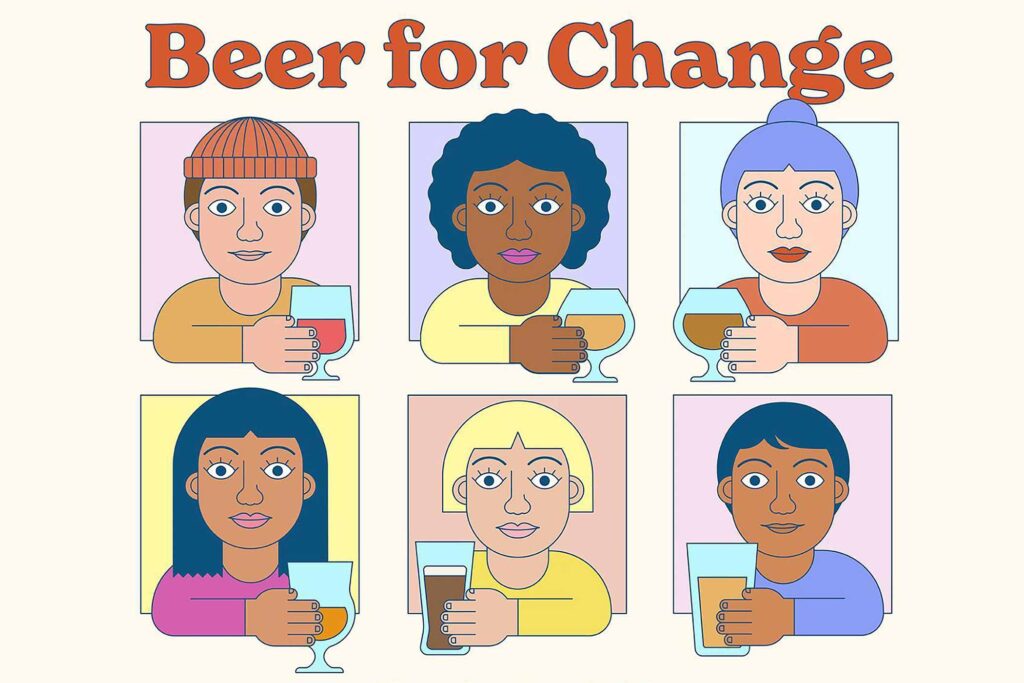
Artwork courtesy of Ashley Devine (@yeahyelhsa and yeahyelhsa.com)
Writing and publicly displaying a code of conduct is one of the first steps to ensuring your brewery creates a safer space for all, whether someone drinks in your taproom or attends an event.
“Not just every brewery should have a code of conduct, but every company,” says Butler. “Every company needs to have one, point blank.”
Butler believes Necromancer’s code of conduct is fundamental to running the business and a crucial part of why employees feel safe working there, and people feel safe drinking in the taproom.
“Especially in the food and beverage space and because of the number of people and situations where alcohol is involved, you need to have a blatant understanding of where the lines are,” says Butler. “The food, beverage, and brewery space has shown that people don’t know where they are or care, and that’s why we need to be this explicit.”
Implementing a code of conduct since day one, Necromancer looked to the Brave Noise movement for helpful language in putting their company standards together. Accordingly, they have an almost three-page document that’s easy to read but crystal clear on what’s acceptable and not in their business.
Butler posted Necromancer’s code of conduct online for anyone to see, and it’s clearly presented to any new employee when they start working.
Butler says in any situation he runs into as a business owner, he always returns to his code of conduct, which helps him make decisions.
Similarly, Urban Roots Brewing & Smokehouse Co-Owner Rob Archie says that it’s the business’ morals that dictate his routine. “The values are the boss; I’m not the boss,” he said during his tap talk at the California Craft Beer Summit. “If people come to me with problems, they know I’m going to ask how this applies to our values, and that is what will make the decision.”
If any brewery isn’t sure where to start, reach out to an organization such as Brave Noise, which has many great resources. Or even companies like Crafted for All, an organization started by Dr. J. Jackson-Beckham (Dr. J.), who currently leads the Brewers Association’s DEI department as the association’s Equity & Inclusion Partner.
Every Beer Festival Needs a Code of Conduct
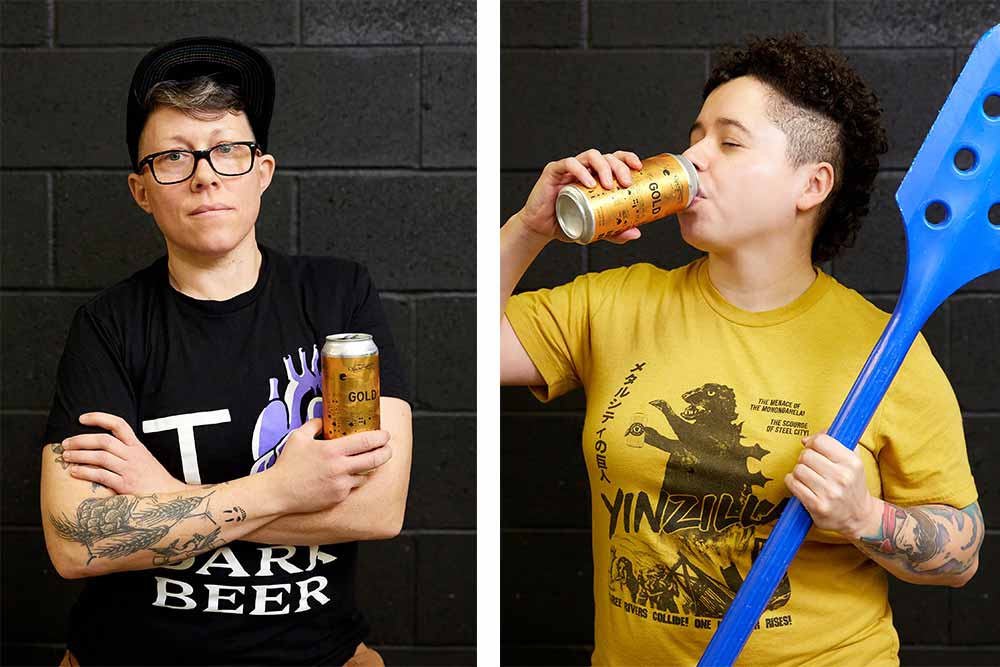
Necromancer Brewing Head Brewer Lauren Hughes (on the left) and Lead Brewer Nina Santiago (on the right) | Photography courtesy of Necromancer Brewing Co.
Since Hughes and Santiago, experienced an incident of discrimination at that festival in May 2022, they’ve been working with members of the Pittsburgh brewing community, including Jen Onofray at Two Frays; Kushner, Rado, and Kara Zupancic at Trace; Robert Dillman at Old Thunder Brewing; Rocco Ieraci at 412 Brewery; Katie Siffrinn at Dancing Gnome; Melissa Larrick and Malcolm Frazer at Hop Farm Brewery; and Caiti Sullivan at Coven Brewing, to push through a code of conduct at the Pittsburgh Brewers Guild.
A seemingly simple endeavor to prevent harassment and create safe spaces at future guild events has proved very challenging. The last year has been one of Hughes’ toughest.
“I won’t lie–this has been one of the hardest things I’ve ever done,” she says.
Pushing through a code of conduct seems like an easy proposition, but people have voiced opposition.
“It’s just getting everyone to understand why it’s important, but also get on board with why it’s important to want to create a safe space, to have a diverse taproom, a diverse staff, and keep things moving along,” says Hughes. “This is something that has huge meaning and value to ourselves as core beings, so having to push and then sometimes getting met with adversity continuously is very taxing,” says Hughes.
But Hughes and the committee persevered. In March, members of the guild voted and approved to engage on outside company called Mattingly Solutions to write a code of conduct. And the subcommittee worked tirelessly to raise the funding needed.
“I’m incredibly proud of everyone on the subcommittee,” says Hughes, noting a fundraiser they hosted in April sold out–and actually exceeded–their fundraising goal. “We’ve all been busting it to get things done, working really hard, so it’s nice to see that our work is getting somewhere, and we’re all pretty pumped.”
At the magazine, we have an extensive code of conduct for all of our festivals posted online. We also partner with organizations like Safe Bars, a group that helps bars, restaurants, breweries, and other alcohol-serving spaces create safe and welcoming cultures for patrons, especially during events.
A code of conduct sets expectations for a brewery’s culture internally and externally.
Up next on Monday 7/3: Creating Safer Spaces in Craft Beer, Part Four — Hire Intentionally and Train Your Team

